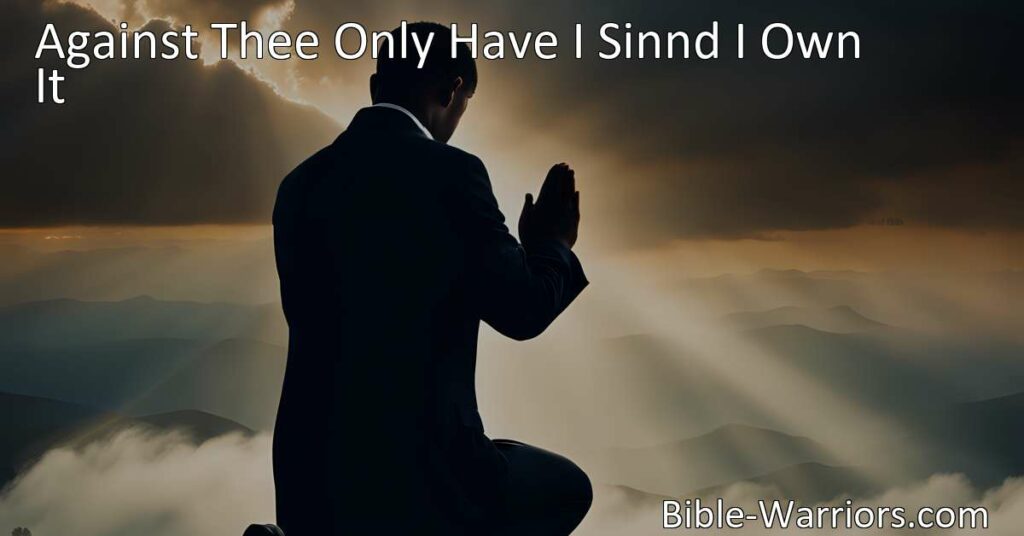Against Thee Only Have I Sinnd I Own It – Hymn Lyric
In the hymn “Against Thee Only Have I Sinnd I Own It,” the author expresses guilt and remorse for their actions. They acknowledge their sins, understand they deserve God’s wrath, and plea for forgiveness and redemption. The hymn highlights the author’s longing for a restored relationship with God and their desire to find joy and gladness through Him.
Table of Contents
Against Thee Only Have I Sinnd I Own It
Against Thee only have I sinn’d, I own it,
And done this evil in Thy sight;
My guilt deserves Thy wrath, and Thou hast shown it,–
Ah! see my grief, my wretched plight.
My secret prayers and sighs Thou hearest plainly,
My tears are ever known to Thee;
Ah God, my God, and shall I seek Thee vainly?
How long wilt Thou be far from me?
Lord, not according to my guilt requite me,
But deal with me in tender grace;
Thy patience and long-suffering still invite me,
I come! Ah hide Thou not thy face!
Make me to sing once more of joy and gladness,
Father of mercies, hear my voice!
For Thy name’s sake, oh raise me from this sadness,
Thou, God, dost love that we rejoice.
Teach me Thy law, with spirit glad and fervent
Let me go forth upon my way;
Thou art my God, I am Thy willing servant
To do Thy pleasure day by day.
Oh haste Thou, my Defence, be now beside me!
Behold, the Lord hath heard my prayer!
Now on a plainer path His hand shall guide me,
My soul is safe beneath His care.
Meaning of Against Thee Only Have I Sinnd I Own It – Hymn Lyric
In this powerful hymn titled “Against Thee Only Have I Sinnd I Own It,” the author expresses a deep sense of guilt and remorse for their actions. It is clear that they acknowledge their sins and understand that they deserve God’s wrath. However, the hymn also highlights the author’s plea for forgiveness, their desire to be closer to God, and their hope for redemption.
The hymn begins by stating, “Against Thee only have I sinn’d, I own it, And done this evil in Thy sight.” Here, the author recognizes that their sins are ultimately against God. They acknowledge their wrongdoing and take full responsibility for it. This admission sets the stage for the rest of the hymn, where the author seeks forgiveness and a renewed relationship with God.
The author goes on to acknowledge that their guilt deserves God’s wrath and that it has been made evident to them. They express their grief and wretchedness, saying, “My guilt deserves Thy wrath, and Thou hast shown itAh! see my grief, my wretched plight.” This demonstrates the author’s understanding of the consequences of their actions and their willingness to confront them.
Despite their guilt, the author believes that God hears their prayers, sighs, and sees their tears. They express their hope in God’s mercy, saying, “My secret prayers and sighs Thou hearest plainly, My tears are ever known to Thee.” This shows the author’s belief in God’s ability to hear and understand their pain. It also reflects their trust in God’s love and compassion.
The author cries out to God, questioning why they have been seeking Him in vain and asking how long He will be far from them. This displays the author’s longing for a restored relationship with God, as they implore, “Ah God, my God, and shall I seek Thee vainly? How long wilt Thou be far from me?” It is clear that the author desires God’s presence in their life once again.
In their plea for forgiveness, the author asks God not to requite them according to their guilt but to deal with them in tender grace. They recognize God’s patience and long-suffering and recognize that it still invites them to come to Him. The author pleads, “Lord, not according to my guilt requite me, But deal with me in tender grace; Thy patience and long-suffering still invite me, I come! Ah hide Thou not thy face!” This demonstrates the author’s understanding of God’s nature and their hope to experience His forgiveness and restoration.
The hymn then shifts focus to the author’s yearning to find joy and gladness. They ask God to make them sing once more, saying, “Make me to sing once more of joy and gladness, Father of mercies, hear my voice!” This highlights the author’s desire for a renewed sense of happiness and contentment, which they believe can only be found through God.
The author recognizes that God loves when His people rejoice and asks Him, for His name’s sake, to lift them from their sadness. They express their faith in God’s ability to bring joy, saying, “For Thy name’s sake, oh raise me from this sadness, Thou, God, dost love that we rejoice.” This serves as a reminder that God’s love for His people extends to their happiness and well-being.
The author then expresses their willingness to learn and follow God’s law. They ask to be taught with a glad and fervent spirit so that they can go forth upon their way as God’s willing servant. The hymn states, “Teach me Thy law, with spirit glad and fervent Let me go forth upon my way; Thou art my God, I am Thy willing servant To do Thy pleasure day by day.” This demonstrates the author’s commitment to live according to God’s commands and to do His will.
Finally, the hymn ends with a declaration of hope and trust in God’s protection and guidance. The author acknowledges that God has heard their prayer and is now by their side. They believe that God will lead them on a plainer path and that their soul is safe under His care. The hymn concludes, “Oh haste Thou, my Defence, be now beside me! Behold, the Lord hath heard my prayer! Now on a plainer path His hand shall guide me, My soul is safe beneath His care.” This serves as a reminder that even in the midst of guilt and remorse, God is always there to offer guidance, protection, and redemption.
In summary, the hymn “Against Thee Only Have I Sinnd I Own It” beautifully captures the writer’s confession of their sins, their plea for forgiveness, and their hope for redemption. Through their honest and heartfelt words, the author demonstrates a deep desire to be reconciled with God, to find joy and gladness, and to live according to His will. This hymn serves as a reminder of God’s love, mercy, and the transformative power of His forgiveness.
I hope this hymn inspired image brings you hope and peace. Share it with someone who needs it today!



